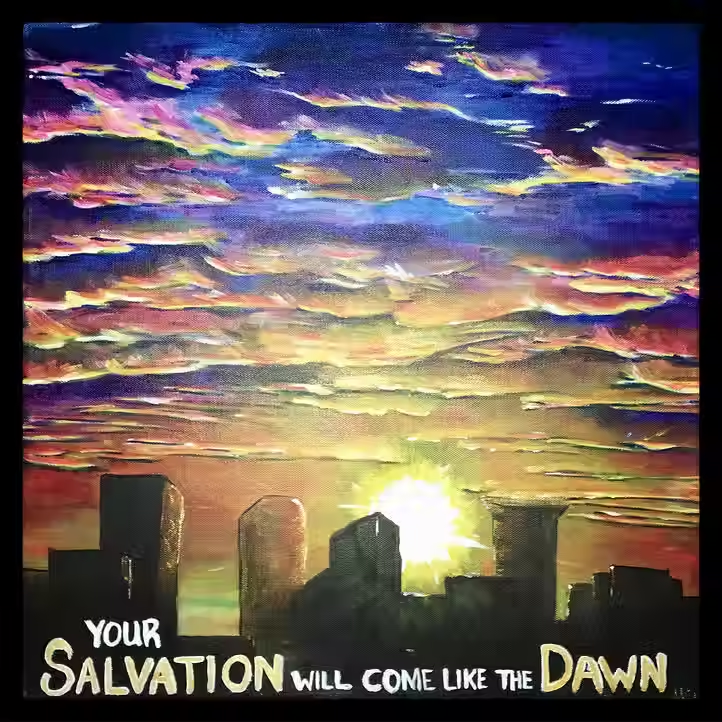A Lent Reflection for Saturday 3.27.2021 by Dr. Veronica Gilliard
- Dr. Veronica Gilliard

- Mar 27, 2021
- 4 min read
Today's Lectionary reading: Psalm 118:1-2, 19-29; Jeremiah 33:10-16; Mark 10:32-34, 46-52
Selected passage for reflection: Jeremiah 33:10-16 (NLT)
Read
Jeremiah 33:10-16
10 “This is what the Lord says: You have said, ‘This is a desolate land where people and animals have all disappeared.’ Yet in the empty streets of Jerusalem and Judah’s other towns, there will be heard once more 11 the sounds of joy and laughter. The joyful voices of bridegrooms and brides will be heard again, along with the joyous songs of people bringing thanksgiving offerings to the Lord. They will sing,
‘Give thanks to the Lord of Heaven’s Armies,
for the Lord is good.
His faithful love endures forever!’
For I will restore the prosperity of this land to what it was in the past, says the Lord.
12 “This is what the Lord of Heaven’s Armies says: This land—though it is now desolate and has no people and animals—will once more have pastures where shepherds can lead their flocks. 13 Once again shepherds will count their flocks in the towns of the hill country, the foothills of Judah, the Negev, the land of Benjamin, the vicinity of Jerusalem, and all the towns of Judah. I, the Lord, have spoken!
14 “The day will come, says the Lord, when I will do for Israel and Judah all the good things I have promised them.
15 “In those days and at that time
I will raise up a righteous descendant from King David’s line.
He will do what is just and right throughout the land.
16 In that day Judah will be saved,
and Jerusalem will live in safety.
And this will be its name:
‘The Lord Is Our Righteousness.’

Reflect
Gunshots. Smoke. Weeping. Shouting. Depression. Destruction. Carnage. Protest. Sickness. Insurrection. Acquittal. Deportation. Xenophobia. Sterilization. Death. Grief. War.
The murder of countless unarmed Black people. Violent hate crimes against people of Asian descent. Kidnapping Latino children from their parents. Disproportionate mortality from COVID-19 among Natives. How do we encounter God in the face of such desolation? How do we believe peace and goodness will be restored to our cities? How do we envision what joy and laughter could sound like amidst such anguish?
In moments of grief, we are tempted to ask difficult questions of God. We wonder how to process being asked to embrace unity as our oppressors continue to ravage our communities. We wonder why the church allows lament to be absent from the conversation. We wonder if we are seen. We wonder if we are heard. We wonder if we are valued. We often have trouble believing in the power and promises of God when everything we touch, see, hear, and smell conjures feelings of angst, anger, and uncertainty. And deep down, we struggle with believing that some people, places, and ideologies are worthy of restoration.
In the midst of our despair, we are challenged to believe that in our present-day God will do for us what He did for Israel and Judah. Our hope is found in remembering how the God of all time continues to faithfully fulfill His promises. In our day, and at this time, God promises to raise up a righteous government that will care for the people in their land. Leaders who will do what is just and right throughout the land.
In our day, and at this time, our hope lies in the promise of God to save us and to provide neighborhoods where all can live safely. The streets will once again be filled with joy and laughter. People will sing joyous songs about the God who keeps promises through delivering and restoring His people.
Then, in our day, and at this time, God will be known by the name of Yahweh Tsidqenu-- Our Lord is our righteousness. People will bring their gifts of thanksgiving to the Lord for all He is doing. This vision will be fulfilled, and we can receive it in our day and for our time in expectant hope of restoration, because all prophetic visions require God’s people to live fully in the ‘here’ but ‘not yet’ tension of restoration unfolding. Our God is a God of justice and He will restore the prosperity of our land and the joy of His people.
Respond
Reflect on a time in your life when you questioned God’s ability to restore something you felt was broken. In what ways did you witness God’s restoration? In what ways are you still waiting for God to bring restoration? Have you gone to God in prayer about these needs and shared them with your local faith community? Commit to journaling about your journey – take note of how it feels to experience God’s restorative power in seasons that felt desolate. In moments of despair, refer back to this journal for encouragement to truly believe in the restorative power of God.
Rest
Lord, in the days when we are filled with fear and trembling, traumatized by the sounds and sights of persecution surrounding us, in these moments of confusion, anxiety, and subjugation, may we remember your sovereignty. May we lean into community and live into your promises with expectant hope for the joy found within your restoration.
About the Author

Dr. Veronica Gilliard is the founder of the Justice, Equity, Diversity and Inclusion Institute, a nonprofit organization committed to demystifying, explicating and mitigating the systemic consequences of the strongholds of patriarchy and white supremacy on the physical, vocational, financial and emotional wellbeing of marginalized people. Learn more at www.jedi-institute.com.





I think the isolation of COVID has added to the feelings of not being seen or heard. How do we share with our community when we aren’t really in contact with them? But God does hear our lament. We are seen and heard by God. Thank you for your reminder of these promises.